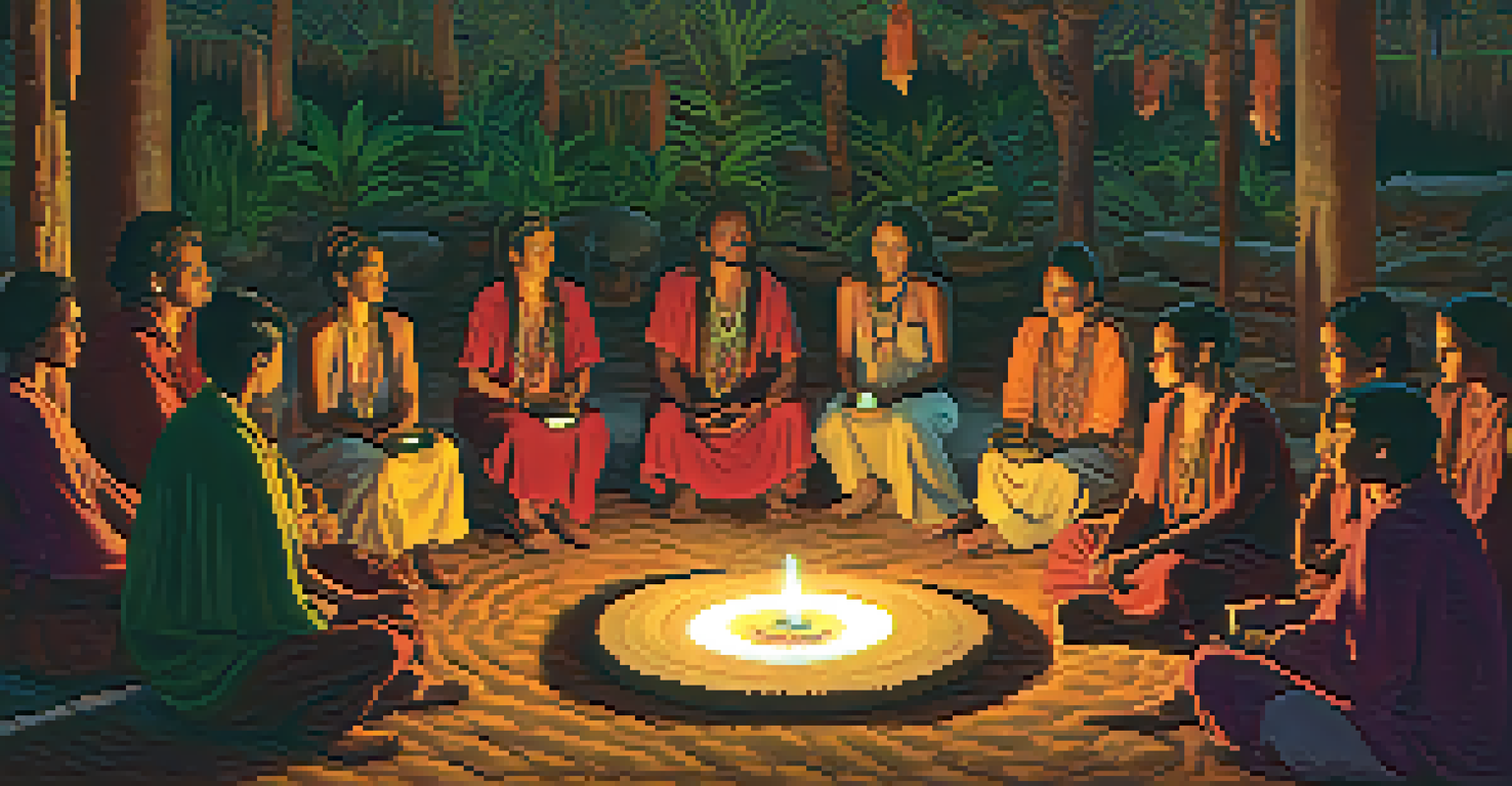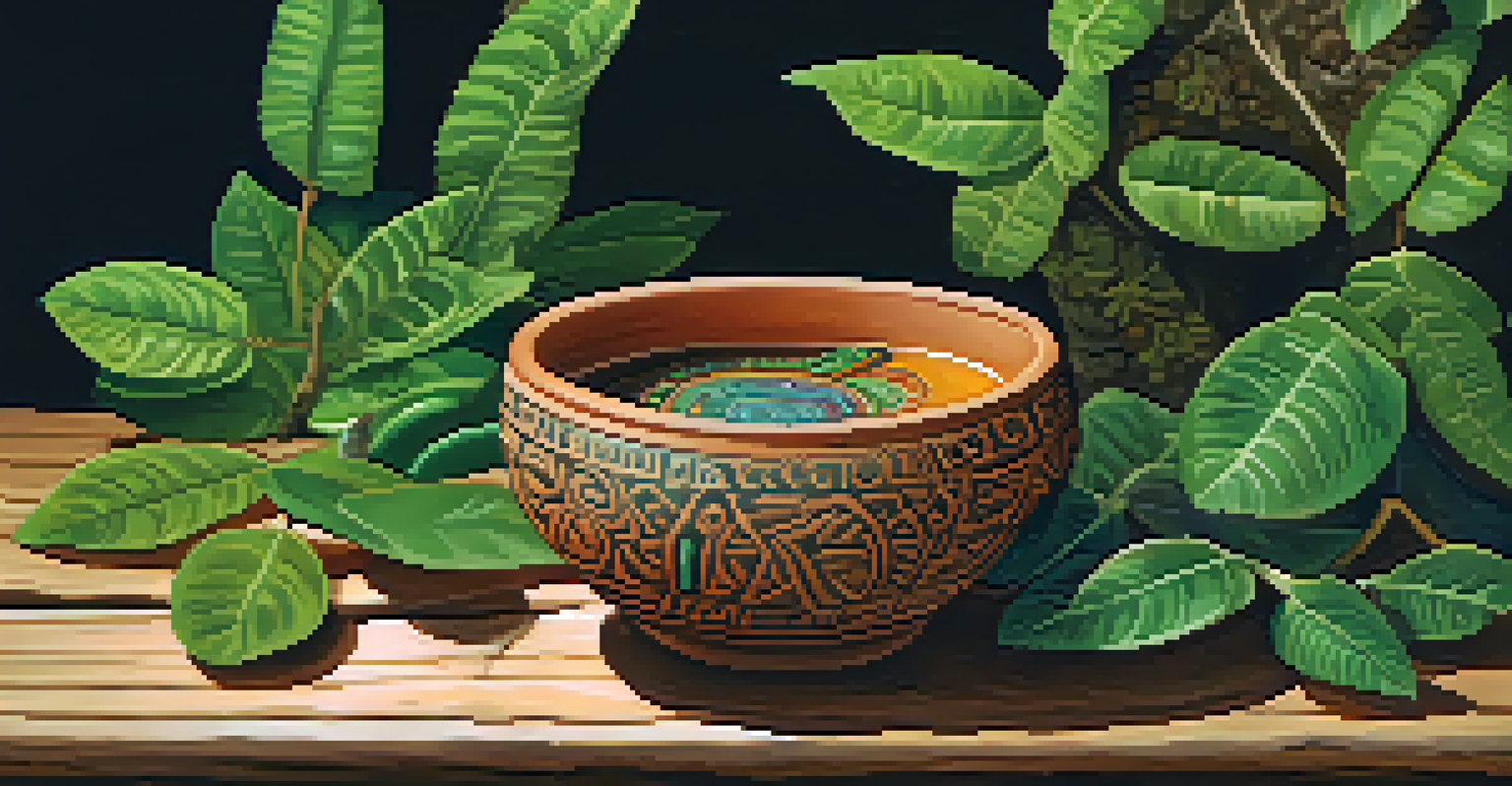Ayahuasca and the Therapeutic Alliance: Building Trust in Therapy

Understanding Ayahuasca's Role in Healing
Ayahuasca is a traditional plant medicine used for centuries in Amazonian cultures, known for its psychoactive properties. This brew, made from the Banisteriopsis caapi vine and other ingredients, is often associated with profound emotional and spiritual experiences. Many individuals seek out Ayahuasca as a means to confront personal challenges, trauma, or mental health issues, which can lead to transformative insights.
The experience of Ayahuasca is not just about the medicine itself, but the relationship built with the facilitator that allows for true healing.
The therapeutic effects of Ayahuasca are not solely about the substance itself but also about the environment in which it is consumed. Participants often engage in ceremonies guided by experienced shamans or facilitators, which can create a safe space for healing. This setting is crucial in fostering an atmosphere where individuals feel supported and understood during their journey.
As individuals navigate their emotions and experiences during an Ayahuasca ceremony, the relationship between the facilitator and participant becomes paramount. This connection lays the groundwork for trust, allowing participants to explore their vulnerabilities and gain deeper insights into their psyche.
The Importance of Trust in Therapy
Trust is the cornerstone of any effective therapeutic relationship. When clients feel safe and understood, they are more likely to open up about their feelings and experiences. This openness can lead to more profound healing and personal growth, as clients can explore issues they may have avoided in traditional therapy settings.

In the context of Ayahuasca therapy, building trust is even more critical due to the intense emotional and psychological experiences participants may undergo. A strong therapeutic alliance can help mitigate fears and hesitations, encouraging individuals to surrender to the experience. This trust allows for a more enriching journey, as participants feel secure enough to confront their innermost thoughts and feelings.
Ayahuasca's Healing Environment Matters
The therapeutic effects of Ayahuasca are enhanced by a supportive environment, often facilitated by experienced shamans.
Moreover, the establishment of trust enhances the overall efficacy of the healing process. When clients believe in their facilitator's intentions and guidance, they are more likely to engage fully in the therapeutic work, paving the way for lasting change.
Building the Therapeutic Alliance
Creating a strong therapeutic alliance involves several key elements, including empathy, respect, and active listening. Facilitators must show genuine concern for participants' well-being, fostering an atmosphere of acceptance and understanding. This approach helps participants feel valued and acknowledged, which can significantly enhance the therapeutic experience.
Trust is the foundation of any therapeutic relationship, especially in the vulnerable space of Ayahuasca ceremonies.
Facilitators who share their own experiences with Ayahuasca can also help demystify the process for participants. By being open about their journeys, they create a sense of camaraderie and shared humanity. This transparency can break down barriers and encourage participants to express their thoughts and fears more freely.
Additionally, facilitators can employ techniques such as grounding exercises or pre-ceremony discussions to build rapport. These practices not only prepare participants for the experience ahead but also reinforce the bond between facilitator and participant, further solidifying the foundation of trust.
Cultural Sensitivity in Ayahuasca Therapy
Cultural sensitivity plays a crucial role in Ayahuasca therapy, especially when practitioners come from diverse backgrounds. Understanding the cultural significance of Ayahuasca in indigenous traditions can enhance the therapeutic alliance. It demonstrates respect for the medicine and its origins, which can resonate deeply with participants seeking authenticity in their healing journey.
Facilitators who are knowledgeable about the cultural context of Ayahuasca can provide richer insights and guidance during the ceremony. This understanding helps participants feel more connected to the experience, as they are not only engaging with the medicine but also honoring its heritage. It can foster a shared respect that enhances trust between participants and facilitators.
Trust is Key in Healing Journeys
A strong therapeutic alliance fosters trust, allowing participants to confront their vulnerabilities during intense emotional experiences.
Moreover, cultural sensitivity encourages inclusivity and openness, which can lead to a more profound group dynamic. When participants feel that their backgrounds and beliefs are respected, they are more likely to engage authentically with the process and with each other.
Navigating Vulnerability in Ayahuasca Ceremonies
Vulnerability is an inherent aspect of the Ayahuasca experience, as participants often confront deeply buried emotions and traumas. This process can be daunting, but a strong therapeutic alliance can provide the necessary support. Facilitators play a pivotal role in helping participants navigate their vulnerabilities, offering reassurance and guidance throughout the journey.
During ceremonies, participants may experience a range of emotions, from joy to despair, as they process their insights. Having a trusted facilitator can make all the difference in how individuals manage these emotions. When they know someone is there to support them, they are more likely to embrace the experience and allow the medicine to work its magic.
Furthermore, creating an environment where vulnerability is normalized can encourage participants to share their feelings openly. This culture of honesty not only strengthens the therapeutic alliance but also fosters a sense of community among participants, enhancing the overall healing experience.
Post-Ceremony Integration and Support
The journey doesn't end once the Ayahuasca ceremony is over; in fact, the integration process is just as vital. Participants often require support to make sense of their experiences and apply their insights to daily life. This is where the therapeutic alliance continues to play a crucial role in providing ongoing guidance and understanding.
Facilitators can offer post-ceremony integration sessions, allowing participants to discuss their experiences and feelings in a safe space. These discussions can help individuals process their insights and emotions, making it easier to incorporate what they learned into their everyday lives. This ongoing support enhances the healing journey and reinforces the bond of trust established during the ceremony.
Cultural Sensitivity Enhances Therapy
Understanding the cultural significance of Ayahuasca enriches the therapeutic experience and strengthens participant-facilitator connections.
Additionally, facilitators can provide resources, such as reading materials or support groups, to help participants continue their growth. This commitment to their well-being underscores the importance of the therapeutic alliance in Ayahuasca therapy, ensuring that individuals feel supported long after the ceremony concludes.
The Future of Ayahuasca in Therapy
As interest in Ayahuasca and its therapeutic potential continues to grow, the importance of the therapeutic alliance will remain central to its practice. Ongoing research into the benefits of Ayahuasca can further validate its role in mental health treatment, particularly when conducted in culturally sensitive and supportive environments. This evolution might lead to more formalized practices that prioritize trust and connection.
Incorporating Ayahuasca therapy into mainstream mental health practices requires a careful approach focused on ethics and participant safety. Establishing guidelines that emphasize the therapeutic alliance can help ensure that individuals receive the support they need throughout their healing journey. This could potentially transform how we view and approach mental health treatment.

Ultimately, the future of Ayahuasca in therapy lies in our ability to blend traditional practices with modern therapeutic techniques. By prioritizing the therapeutic alliance, we can create a more inclusive and effective healing environment for those seeking transformation through Ayahuasca.